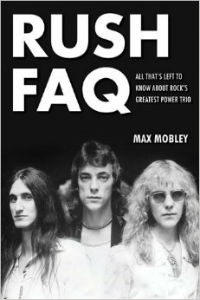Skip to main content
Rush FAQ: All That's Left To Know About Rock's Greatest Power Trio Book Coming in April

Update: This book is now scheduled to be released on June 17th.
A new reference book on Rush will be published this April from long-time Rush aficionado Max Mobley. The book, titled Rush FAQ: All That's Left To Know About Rock's Greatest Power Trio will be released on April 29th and is available for pre-order now via Amazon.Com:Rush FAQ documents the amazing story of the worlds greatest Canadian prog rock power trio, from its origins in a church basement in Willowdale, Ontario, to its induction ceremony at the Rock and Roll Hall of Fame. Covering 40 albums, 10 DVDs, thousands of mesmerizing live shows, and millions of rocks most loyal fans, the story of Rush is as epic and unique as its music. Rush has been maligned by the press for decades, and misunderstood by a legion of mainstream rock fans and rock glitterati. And yet only the Beatles and Rolling Stones have earned more gold and platinum records. Few artists, if any, have been as influential as Rushs three virtuososbassist-keyboardist-vocalist Geddy Lee, guitarist Alex Lifeson, and drummer-lyricist Neil Peart. Rushs focus has always been about its muse and its music. As such, Rush FAQ studies the evolution of the bands sound, from the early days of Zeppelin-esque blues-rock to complex, synth-laden opuses to the return of concept-album bombast with the critically acclaimed Clockwork Angels. With wit, humor, and authority, music industry veteran and unabashed Rush geek Max Mobley examines the music, gear, personalities, and trials and tribulations of one of rock and rolls truly legendary acts. It is a story Rush fans will treasure and rock and roll fans will admire.
Author Max Mobley, who most recently interviewed Alex Lifeson for a 2009 issue of Premiere Guitar Magazine, has provided an exclusive extract of his book for Cygnus-X1.Net:With All the World’s a Stage, Rush was testing themselves by touching the boundaries of rock and roll, and then pushing it to see what happened. They were at the foot of a mountain and eager to climb. With Exit...Stage Left, the climb had begun, and through the songs they were now capable of writing, they assured onlookers (fans) that they knew what they were doing, while doubters hoped for a fall. In Grace Under Pressure, they had reached a plateau and were adjusting to the giddy atmosphere that was the eighties. In A Show of Hands, they seemed to want to make sure that everyone knew that, whereas they have yet to reach the peak, they were having a good time (which they undoubtedly were) and that they deserved to be there right alongside their fellow successful musical brethren. Nearing the summit, god-awful tragedy strikes. And having suffered a great fall, with Different Stages they planted a flag in the hopes of not being forgotten, reminding anyone who cared that they once were there. From the bottom of the crevasse where they had landed, rescue seemed dubious—like something greater than music had swallowed them whole like Jonah to the whale. Different Stages was also the call for compassion—the only thing that mattered at the time (Absalom! Absalom!). With Rush in Rio, they had climbed out of that chasm (both privately and publicly) under their own power—music. They were different, now and forever. But they were also, in some ways, better. Looking around, during those last minutes of the Vapor Trails tour in Rio, they realized that they were looking down from the summit. They had made it, but their stance there was somewhat tenuous because it almost never happened. But it did. And thousands of Brazilians helped them realize not only had they made it, but the climb was over—they could relax. As if...
And then came R30.
With the mountain conquered, it was time to take in the view all around them. It was time to allow themselves a pat on the back. There was nothing left but to celebrate. And they did — with thirty-one songs and thousands of their best friends from Europe and North America. Thank God.
A band that never gave a damn about fame or acceptance now had masses lining up as if to give an overdue apology, admitting that Rush and Rush fans were right all along. (What were we thinking ...?) The power of their music need not be measured in riffs or the number of complicated time changes. It need not be measured at all anymore: the word Rush itself was all that need be said. The music on R30 was as serious as always for the band, and seriously played and devoured. And, at the same time, Lee, Lifeson and Peart, and the fantastic (and at times fantastically funny) stage show made sure we knew such things should never be taken too seriously. True.
Thanks to Max Mobley for the information on the book and the excerpt.


Comments
Post a Comment